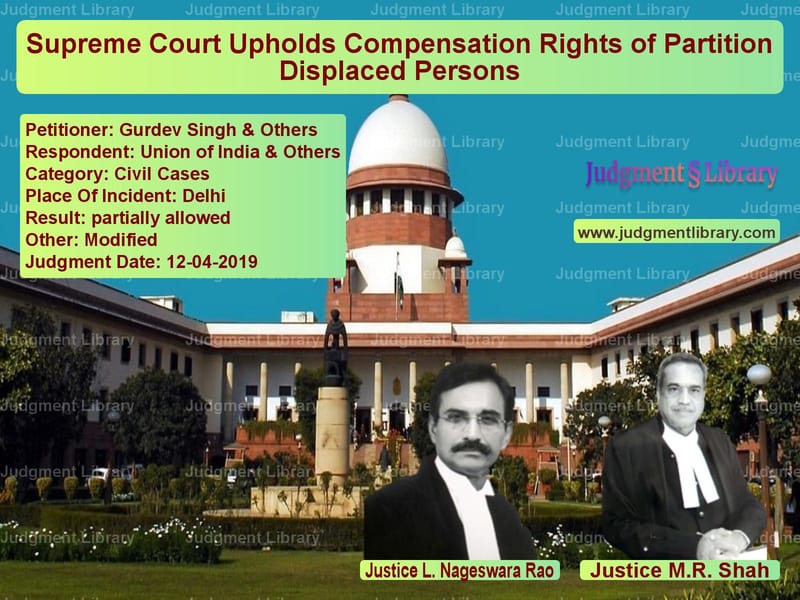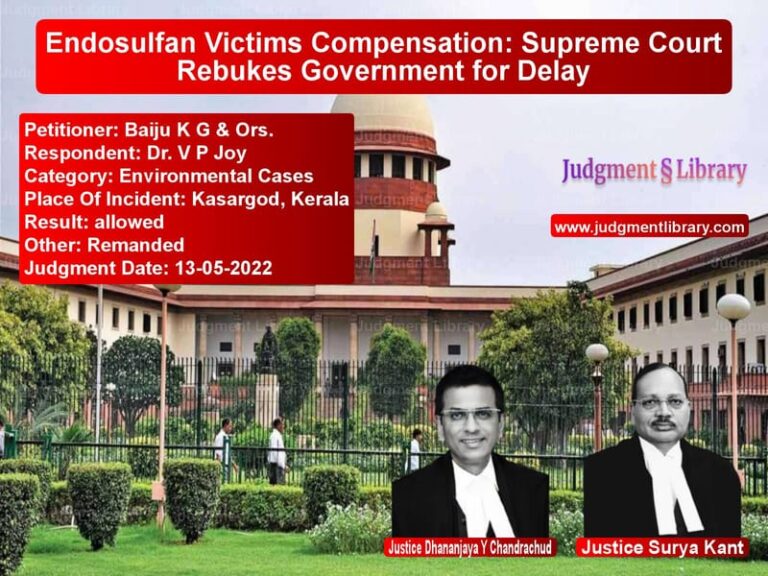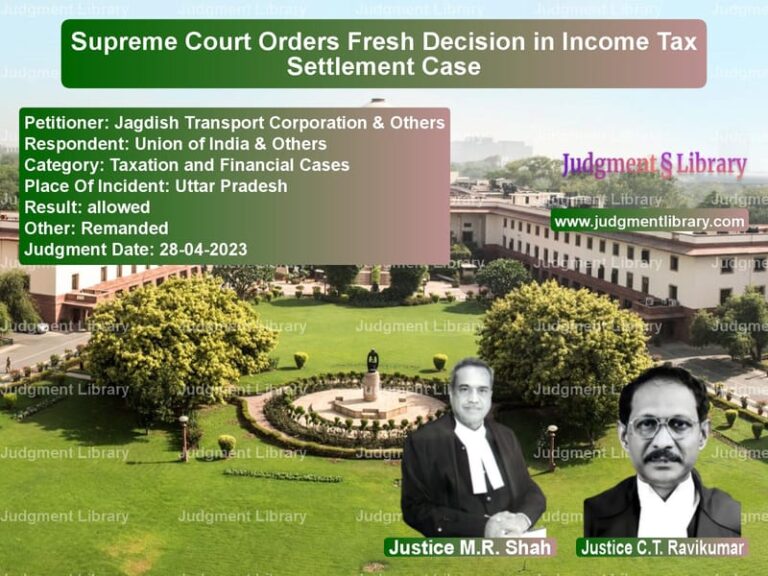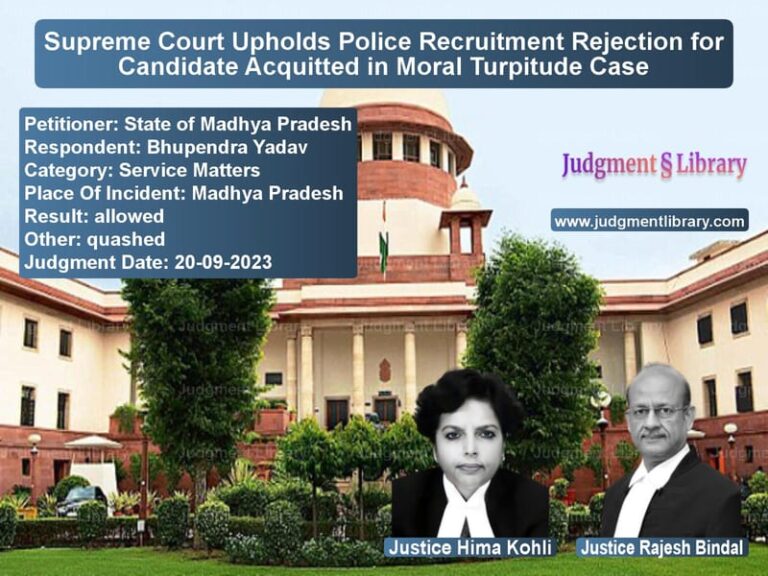Supreme Court Upholds Compensation Rights of Partition Displaced Persons
The Supreme Court of India delivered a significant judgment on April 12, 2019, in the case of Gurdev Singh & Others vs. Union of India & Others, addressing the rights of displaced persons under the Displaced Persons (Compensation & Rehabilitation) Act, 1954. The case revolved around the allocation of property to a displaced individual who migrated from Pakistan during partition, and the valuation dispute concerning the land offered for rehabilitation.
Background of the Case
The case involved the heirs of Hem Singh, a partition migrant registered as a displaced person, whose claims regarding property left in Pakistan were verified in 1951. Under the 1954 Act, properties were allocated for displaced persons to compensate for their losses. The dispute in this case arose when, in 1985, the government offered Hem Singh a property for a price of Rs. 26,01,846, based on prevailing market rates.
Arguments by the Petitioners
- The main argument presented by the petitioners (heirs of Hem Singh) was that the valuation should have been based on rates prevalent in 1955, when the rehabilitation rules came into force, rather than the high valuation in 1985.
- Initially, the petitioners challenged the valuation through appeals before the Settlement Commissioner and later through revisions under the Act, but these were dismissed on procedural grounds.
- Eventually, before the Delhi High Court, the petitioners agreed to pay the 1985 valuation, along with interest at 10% per annum.
Arguments by the Respondents
- The Union of India argued that the High Court’s Single Judge erred in directing the sale of the property at 1985 rates in 2009-10, when the market value had increased substantially.
- The respondents contended that the valuation method applied was in accordance with the law and should not be revised decades later.
Delhi High Court’s Decision
The Single Judge of the Delhi High Court ruled in favor of the petitioners, directing the sale of the property at 1985 rates with a 10% per annum interest component. However, the Division Bench of the High Court later reversed this ruling in favor of the government, leading to an appeal before the Supreme Court.
Supreme Court’s Observations
- The Court acknowledged that the entitlement of Hem Singh to the property was undisputed and that he was offered the property in 1985.
- It noted that the petitioners had initially contested only the valuation and had later agreed to pay the price determined in 1985.
- The Court considered the market valuation of the property in 2019, which was determined to be Rs. 6,14,79,533.
- Taking into account fairness and reasonability, the Court ruled that asking the petitioners to pay the current market rate would be unfair, but allowing them to pay 1985 rates would be equally unreasonable.
Final Judgment
- The Supreme Court set aside the Division Bench’s ruling and ordered the petitioners to pay a total of Rs. 3,66,30,000 for the land and Rs. 20,00,000 for the existing building.
- Considering that the petitioners had already deposited Rs. 89 lakhs with the High Court, which had accrued interest bringing the total to Rs. 1.41 crores, the Court allowed them to deduct this amount from the final payable sum.
- The respondents were directed to execute the sale deed and hand over possession upon full payment.
Legal Implications
- The ruling clarifies the balance between historic valuations and modern economic realities in cases involving displaced persons.
- The Court emphasized the need for equity in rehabilitation measures while ensuring that the government’s interests are not unduly compromised.
Conclusion
This judgment underscores the Supreme Court’s role in balancing rehabilitation rights with fair property valuation, ensuring that partition-displaced persons receive just compensation while acknowledging the economic evolution over decades.
Petitioner Name: Gurdev Singh & Others.Respondent Name: Union of India & Others.Judgment By: Justice L. Nageswara Rao, Justice M.R. Shah.Place Of Incident: Delhi.Judgment Date: 12-04-2019.
Don’t miss out on the full details! Download the complete judgment in PDF format below and gain valuable insights instantly!
Download Judgment: Gurdev Singh & Other vs Union of India & Oth Supreme Court of India Judgment Dated 12-04-2019.pdf
Direct Downlaod Judgment: Direct downlaod this Judgment
See all petitions in Property Disputes
See all petitions in Succession and Wills
See all petitions in Judgment by L. Nageswara Rao
See all petitions in Judgment by Mukeshkumar Rasikbhai Shah
See all petitions in partially allowed
See all petitions in Modified
See all petitions in supreme court of India judgments April 2019
See all petitions in 2019 judgments
See all posts in Civil Cases Category
See all allowed petitions in Civil Cases Category
See all Dismissed petitions in Civil Cases Category
See all partially allowed petitions in Civil Cases Category







